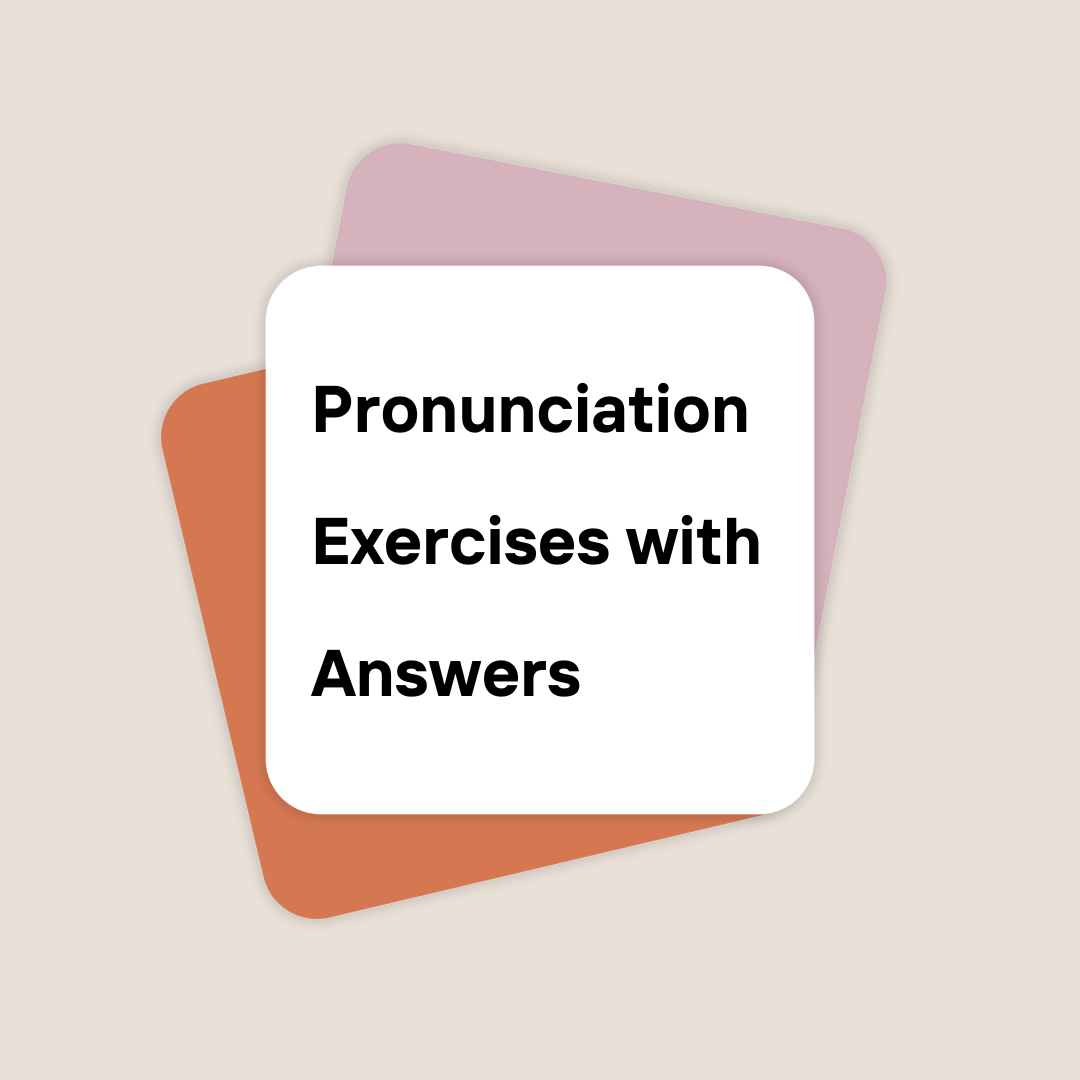Pronunciation is an important part while learning English, whether you’re at beginner level or intermediate. Clear and accurate pronunciation not only helps in communication but also boosts your confidence. In this blog, we have mentioned pronunciation exercises with answers, tailored for different age groups and proficiency levels. We have also included English pronunciation practice words, sentences, and paragraphs, along with resources for American and British English pronunciation.
Why Pronunciation Exercises with Answers Are Important?
Pronunciation exercises with answers help in:
- Improving clarity and fluency in speaking.
- Building confidence in conversations.
- Enhance listening skills by recognizing correct sounds.
- Preparation of academic, professional, and social interactions.
Pronunciation Exercises for Beginners
Here are some Pronunciation Exercises for Beginners:-
Vowel Sounds Exercise 1:
- Practice the five vowel sounds: A, E, I, O, U.
- Example words below:
- A: Cat, Hat
- E: Pen, Bed
- I: Sit, Hit
- O: Dog, Log
- U: Cup, Sun
Consonant Sounds Exercise 2:
- Practice some common consonant sounds like P, T, K, S.
- Example words below:
- P: Pen, Park
- T: Top, Ten
- K: Kite, King
- S: Sun, Sit
Answer: Repeat each word slowly, focusing on the each correct sound.
Pronunciation Exercises for Adults
Here are few Pronunciation Exercises for Adults:-
Minimal Pairs Exercise 1:
- Practice words that differ by only one sound.
- Ship / Sheep
- Bat / Bet
- Cat / Cut
Stress and Intonation Exercise 2:
- Practice stressing the correct syllable in words.
- PHOtograph (noun) vs. phoTOGraphy (noun)
- PREsent (noun) vs. preSENT (verb)
Answer: Record yourself and compare your pronunciation with the native speakers.
Pronunciation Exercises for Kids
Make pronunciation fun with these Pronunciation Exercises for Kids:-
Rhyming Words Exercise 1:
- Practice these rhyming words to improve sound recognition.
- Cat, Hat, Bat
- Sun, Fun, Run
Tongue Twisters Exercise 2:
- Use below mentioned simple tongue twisters to practice tricky sounds.
- “She sells seashells by the seashore.”
- “Peter Piper picked a peck of pickled peppers.”
Answer: Encourage kids to repeat slowly and then faster for fun.
English Pronunciation Practice Paragraphs
Here’s a sample below of English Pronunciation Practice Paragraphs:-
Paragraph:
“The quick brown fox jumps over the lazy dog. This sentence contains every letter of the alphabet. Practicing such sentences helps improve pronunciation and fluency.”
Answer: Record yourself and compare with an audio sample.
Pronunciation Exercises with Audio
Below are few Pronunciation Exercises with Audio:–
- Use apps like Duolingo, Pronuncian, or Forvo.
- Listen to native speakers on YouTube channels like BBC Learning English or Rachel’s English.
Example:
- Listen to the word “Water” pronounced in American English (WAH-ter) and British English(WOH-ter).
English Pronunciation Practice Words
Below is the list of English Pronunciation Practice Words:-
- Th sounds: Think, This, That
- R and L sounds: Right, Light, Red, Led
- V and W sounds: Very, Wet, Vine, Wine
Pronunciation Practice Sentences
Some Pronunciation Practice Sentences to improve fluency:-
- “I saw a kitten eating chicken in the kitchen.”
- “How can a clam cram in a clean cream can?”
- “Friendly fleas and fireflies flew freely in the forest.”
Answer: Focus on clarity and stress patterns.
Pronunciation Activities for Students
Few interactive Pronunciation Activities for Students:-
- Role-Playing: Act out dialogues with correct pronunciation.
- Word Bingo: Create bingo cards with the challenging words.
- Pronunciation Stations: Set up stations for different sounds (e.g., /th/, /r/, /l/).
American English Pronunciation Exercises
American English Pronunciation Exercises to Practice:-
- Flap T: Water (sounds like “Wah-der”)
- R-Colored Vowels: Car, Bird, Her
- Reduced Vowels: Banana (sounds like “buh-NA-nuh”)
British English Pronunciation Exercises
British English Pronunciation Exercises to Practice:-
- Long A: Bath (sounds like “Bahth”)
- Glottal Stop: Butter (sounds like “Bu’er”)
- Non-Rhotic R: Car (sounds like “Cah”)
Conclusion
Mastering pronunciation takes time and practice, but with the right exercises and resources, anyone can become perfect. Whether you’re a beginner, an adult, or a kid, these exercises and activities will help you speak English fluently and confidently. Don’t forget to use audio resources and practice regularly for the best results.
